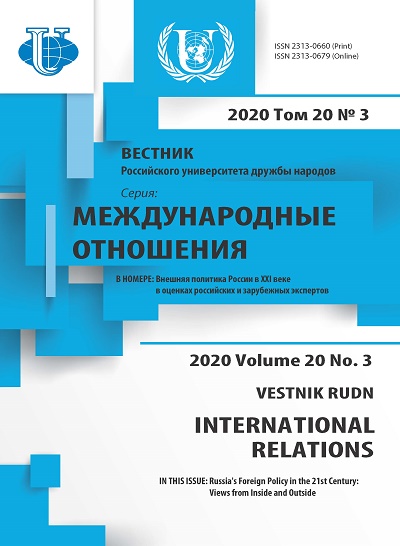Разрушение мирового либерального миропорядка и российская внешняя политика: направления, противоречия и перспективы
- Авторы: Кощеева Л.В.1
-
Учреждения:
- Университет штата Северная Каролина
- Выпуск: Том 20, № 3 (2020): Внешняя политика России в XXI веке в оценках российских и зарубежных экспертов
- Страницы: 463-475
- Раздел: ТЕМАТИЧЕСКОЕ ДОСЬЕ
- URL: https://journals.rudn.ru/international-relations/article/view/24621
- DOI: https://doi.org/10.22363/2313-0660-2020-20-3-463-475
- ID: 24621
Цитировать
Полный текст
Аннотация
Современный мир стоит перед стратегической задачей по реформированию основ управления международной политикой, которая демонстрирует признаки значительной дестабилизации. Происходит поиск новых способов достижения равновесия интересов на глобальном, региональном и национальном уровнях. Разработка сложных и адаптируемых формул для управления отдельными аспектами международного взаимодействия становится все более сложным и нестабильным. Последствия нестабильности в разных странах различны, однако кризисные явления на глобальном уровне все больше определяются внутриполитическими проблемами отдельных стран. Что же объясняет статус и позицию России в мире в контексте этих глобальных преобразований? Автор статьи утверждает, что, поскольку государства активно пытаются адаптироваться к новым реалиям в целях выживания или усиления влияния, положение России будет зависеть от того, насколько адекватно она сможет реагировать на вызовы и насколько эффективно она сможет использовать свои преимущества. Россия должна не просто воспринимать результаты глобальной турбулентности, а скорее использовать и активно развивать свое сотрудничество, твердо связывая внешнюю политику с приоритетами внутреннего развития. Хотя Россия и проводит активную внешнюю политику, последовательно отстаивая свои интересы и объединяя усилия для поиска оптимальных решений многих современных проблем, она еще не сформулировала согласованную стратегию безопасности и не выработала видение будущего мирового порядка. Успех может зависеть от понимания текущих тенденций, признания возможностей и демонстрации своего лидерства, готовности разделить ответственность за результаты, а также проведения важных внутренних реформ.
Об авторах
Лада В. Кощеева
Университет штата Северная Каролина
Email: lada_kochtcheeva@ncsu.edu
доктор политических наук, доцент Роли, США
Список литературы
- Bordachev, T.V. (2018). Revisionism of Powers in the Changing Historical Context. Russia in Global Affairs, 16 (3), 46-65. doi: 10.31278/1810-6374-2018-16-3-46-65
- Colton, T.J. (2016). Russia: What Everyone Needs to Know. New York, NY: Oxford University Press.
- Dasgupta, S. (2004). The Changing Face of Globalization. New Delhi: SAGE Publications.
- Duncombe, C. & Dunne, T. (2018). After Liberal World Order. International Affairs, 94 (1), 25-42. doi: 10.1093/ia/iix234
- Freedman, L. (2014). Ukraine and the Art of Limited War. Survival, 56 (6), 7-38. DOI: 10.1080/ 00396338.2014.985432
- Gotz, E. (2017). Putin, the State, and War: The Causes of Russia’s Near Abroad Assertion Revisited. International Studies Review, 19 (2), 228-253. doi: 10.1093/isr/viw009
- Ikenberry, G.J. (2015). The Future of Liberal World Order. Japanese Journal of Political Science, 16 (3), 450-455. doi: 10.1017/S1468109915000122
- Ikenberry, G.J. (2018). The End of the Liberal International Order? International Affairs, 94 (1), 7-23. doi: 10.1093/ia/iix241
- Kanet, R. (2018). Russia and Global Governance: The Challenge to the Existing Liberal Order. International Politics, 55 (2), 177-188. doi: 10.1057/s41311-017-0075-3
- Karaganov, S. & Suslov, D. (2018). A New World Order: A View from Russia. In: Shulze, P.W. (Eds.). Multipolarity: The Promise of Disharmony. Frankfurt am Main: Campus Verlag. P. 59-82.
- Kochtcheeva, L.V. (2020). Russian Politics and Response to Globalization. London, New York: Palgrave Macmillan.
- Kortunov, A. (2019). Between Polycentrism and Bipolarity. Russia in Global Affairs, 17 (1), 10-51. doi: 10.31278/1810-6374-2019-17-1-10-51
- Legvold, R. (2017). Into the Unknown: U.S.-Russian Relations Unhinged. Valdai Papers, 64, 1-20.
- Lukyanov, F. (2020). Start from Yourself and Finish from Yourself. Russia in Global Affairs, 18 (1), 202-217. (In Russian). URL: https://globalaffairs.ru/articles/nachat-s-sebya-i-soboj-zakonchit/ (accessed: 04.03.2020)
- Makarychev, A. (2014). Russia and the EU in a Multipolar World: Discourses, Identities, Norms. Stuttgart: Ibidem Press.
- Mankoff, J. (2009). Russian Foreign Policy: The Return of Great Power Politics. Lanham, MD: Rowman and Littlefield.
- Mearsheimer, J.J. (2018). The Great Delusion: Liberal Dreams and International Realities. New Haven, CT: Yale University Press.
- Miller, C. (2019). Understanding Russian Foreign Policy. Orbis, 63 (1), 150-153. doi: 10.1016/j.orbis.2018.12.012
- Monaghan, A. (2016). The New Politics of Russia: Interpreting Change. Manchester, UK: Manchester University Press.
- Safranchuk, I. (2018). Russian-U.S. Relations: Torn between the Practical and Ideational Agendas. Russia in Global Affairs, 16 (4), 96-119. doi: 10.31278/1810-6374-2018-16-4-96-119
- Sakwa, R. (2014). Putin Redux: Power and Contradiction in Contemporary Russia. New York, NY: Routledge.
- Sakwa, R. (2017). Russia Against the Rest: The Post-Cold War Crisis of World Order. Cambridge: Cambridge University Press.
- Sparke, M. (2013). Introducing Globalization: Ties, Tensions, and Uneven Integration. Wiley-Blackwell.
- Torkunov, A.V. (2012). Contemporary International Relations. Moscow: Aspekt Press publ. (In Russian).
- Trenin, D. (2018). Vladimir Putin’s Fourth Vector. Russia in Global Affairs, 16 (1), 148-159.
- Tsygankov, A. (2019). Russia’s Foreign Policy: Change and Continuity in National Identity. Lanham, MD: Rowman & Littlefield.
- Tsygankov, A. (2020). G - Great Powerness. Russia in Global Affairs, 18 (1), 85-91. doi: 10.31278/1810-6374-2020-18-1-85-91
Дополнительные файлы










